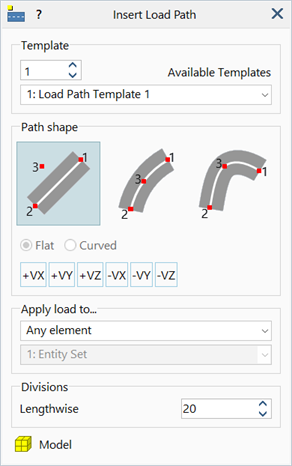Insert: Path

Description
Inserts a load path by clicking a start point, an end point and a reference point.
Points may be nodes, grid points or vertices.
Dialog
Number
The load path template number as an integer.
If a real number is entered, the property number is rounded to the nearest integer.
Negative numbers and zero are set to 1.
Available Templates
Load path templates define the loads and other properties of the path. Templates may be created and edited under LAYOUTS: Paths.
The dropdown list shows the template numbers that currently exist. It allows for quick selection of an existing template and is synchronised with the updown control. The updown control allows for the input of any number, even if the template does not yet exist. Selecting an item from the dropdown list automatically sets that number in the updown control; conversely, changing the updown control automatically sets the dropdown list. If a template number entered in the updown control does not yet exist, the dropdown list is cleared.
Path shape
Load paths can be flat on a plane, with straight, circular or parabolic shape. They can also be curved out-of-plane, with either circular or parabolic curvature.
Each type of path is defined by three points: P1 and P2 define the end points while P3 defines the plane and curvature.
-
Flat
Path lies on a plane. Applicable to straight, circular and parabolic paths.
-
Curved
Path is curved out-of-plane. Applicable only to circular and parabolic paths.
-
+VX/+VY/+VZ/-VX/-VY/-VZ
Set the straight path plane to align with the +X, -X, +Y, -Y, +Z and -Z global axes, respectively, avoiding the need to have a third point available to define the plane.
These functions activate only when inserting the third point for a straight path.
Apply load to...
Sets the element type to which the load from the path will be applied.
-
Any element
Applies load to the nearest element to the load path. The element can be a beam, a plate or a brick.
-
Beams only / Plates only / Bricks only
Applies load to only one of beams, plates or bricks, respectively.
-
Elements in entity set
Applies load only to elements contained in the selected entity set. Entity sets may contain a mixture of beam, plate and brick elements.
Entity Set
Entity set containing the elements onto which the path will apply the loads.
Used only when Element in Entity Set is selected for Apply Load To.
Divisions
Number of divisions used to discretise the load path.
This controls the number of positions that a given load on the path can occupy in the longitudinal direction as it travels from one end to the other. By increasing the number of divisions, the resolution and accuracy will be increased, but so will the processing time.
Path group
The group to which the inserted load path is added. See Target group.
See Also